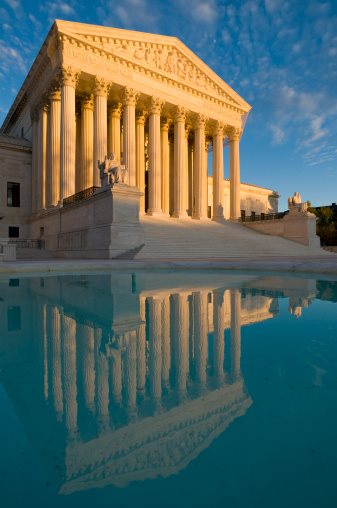
Do I need an Appeals Lawyer?
After a decision is rendered in a criminal or civil trial, the party who loses has the right to have the decision reviewed by a higher court. This maneuver, known as the appeals process or appellate procedure, follows appellate law—a legal framework that consists of the practices and rules by which a higher court reviews a lower court’s judgments.
Appellate law–because of the lack of discovery and the fact that the appeals record is limited to what was already presented in the previous hearing– is distinct from other forms of litigation. An appeal is presented to a multi-judge review board and is decided almost exclusively on the written briefs that are constructed from the evidence exchanged in the prior hearing.
An appeal is the formal process by which a higher court reviews the decision rendered by a lower trial court. The right to repeal an undesirable legal decision is affirmed in the United States Constitution and coordinating state constitutions. The appellate system offers a check on the power of judges and juries; the process grants a higher court the authority to overturn what it may consider an erroneous or unconstitutional judgment or ruling that it otherwise deems insufficient. Any part that faces an adverse court decision is given the right to appeal. This right applies to all entities, including government agencies, corporations and individual citizens. If a case is brought to an appeals court it will be deliberated on and rendered by an individual judge—juries do not preside over the appeal process.
An appeals lawyer therefore elucidates– and deals with– judgments that are deemed “appealable”, what is required for a reversal of the lower court (i.e. offering a new argument or affirming “clear error”), how appeals are brought before a court and what procedures and regulations each part must abide by. Furthermore, an appeals lawyer is also involved in issues regarding challenging and posting appellate bonds, writs of habeas corpus, writs of restitution, writs of execution, writs of administrative mandamus, writs of certiorari, writs of prohibition and other variations of discretionary of relief, post-verdict motions and the pursuit of further relief on remand.
Because the appellate process is confusing and multifarious with regards to state procedure (the appellate process also varies in the federal circuit as well), it is best to consult with a qualified appeals lawyer before engaging in the process. Appeals lawyers are well-versed in the varying state or federal district courts in which your matter was tried.
Since a trial and an appellate hearing are two different forms of legal practice, the attorney who represented the individual at the trial will not automatically file or preside over the individual’s appeal. The individual therefore may ask his or her lawyer to retry the case or may find a specialized appeals lawyer to undertake the appellate process.
Overall, if you wish to appeal an adverse decision rendered in court, you will need to consult with a legal professional who specializes in the appeals process. Oftentimes, your legal representative who litigates in the original trial will also serve as your appeals lawyer; however, if you are unhappy with your representation or if the individual does not specialize in the appellate process, you should seek the advice of an appeals lawyer.
How do I find an Appeals Lawyer?
If you are unhappy with your legal representative or if the individual is unable to adhere to or inexperienced with, the appellate process, you must search for an appeals lawyer. To find a suitable appeals lawyer in your area, you must utilize all available resources, including the Internet, referrals and word-of-mouth references.
To begin your search for an appeals lawyer, you should execute Internet searches to compile a list of all professionals in your area. Once you have compiled a list you should cross-reference each individual with your state’s BAR association website, as well as their coordinating legal firm. You state’s BAR website will list all appeals lawyer in your region, their license status, number of years experience and any disciplinary actions taken against the individual. Note: it is essential to hire an appeals lawyer who is in good standing with the BAR association and licensed to practice in your state.
In addition to viewing your state’s Bar Association website you should evaluate the professional’s biographical information, listed on his or her law firm’s website. This information will enable you to get a feel for prospective appeals lawyers in your area, while supplying you with their contact information.
Contacting Appeals Lawyers:
When you have narrowed your list of prospective of appeals lawyers, you should contact them to discuss your case and your desire for appeals. During this communication you should take note of the individual’s speech, his or her ability to listen and their understanding of the appeals process. The availability and associated fees for meeting appeals lawyers—before representation is confirmed—will vary based on the individual and his or her law firm.
When you are consulting with or talking to appeals lawyers it is essential to evaluate their experience. Adherence to the appeals procedure requires a great understanding of the process and attached regulations; experience is the one variable that forecasts an appeals lawyer’s ability to follow said rules. In general, you will want to hire an appeals lawyer with at least 5 years experience in the appellate process. This experience will yield and ability to expedite the appeals process and evaluate the wrongdoings present in the previous hearing.
Evaluating Fees:
When you have developed a rapport with an appeals lawyer in your area you must have him or her elucidate the attached payment schedule. Appeals lawyers may require payment in the following formats: hourly, flat-fee or retainer agreements. These schedules will yield different sums, so it is essential to go-over, in detail, their fees and payment agreement.
An appeal lawyer is a legal representative who presides over a previously-rendered court decision. The goal of an appeal lawyer is to have the decision—which is always deemed as adverse or undesirable by the filing party—reversed. An appeal lawyer is an experienced legal professional who understands the varying laws and attached regulations of the appeals process. Although the legal representative who presided over the original trial may represent you in the appellate hearing, an appeal lawyer (legal representative who specializes in the appeal process) should be contacted to discuss the first hearing and the facts surrounding the case.
Appeals lawyers are legal professionals who preside over appeals cases—cases that review the decision rendered in a lower court. Any party who receives an adverse judgment may appeal the ruling in a higher court; this process is litigated by appeals lawyers.
Appeals lawyers are legal specialists who preside over the aforementioned matters. These professionals adhere to the complex and varying appeal regulations instituted by state and federal courts. These regulations limit appeals lawyers with regards to how they can litigate over the review. The goal, even with these limitations, is to have the previously-rendered decision reversed as a result of a jury’s negligence or the presence of mishandled evidence in the previous hearing.








